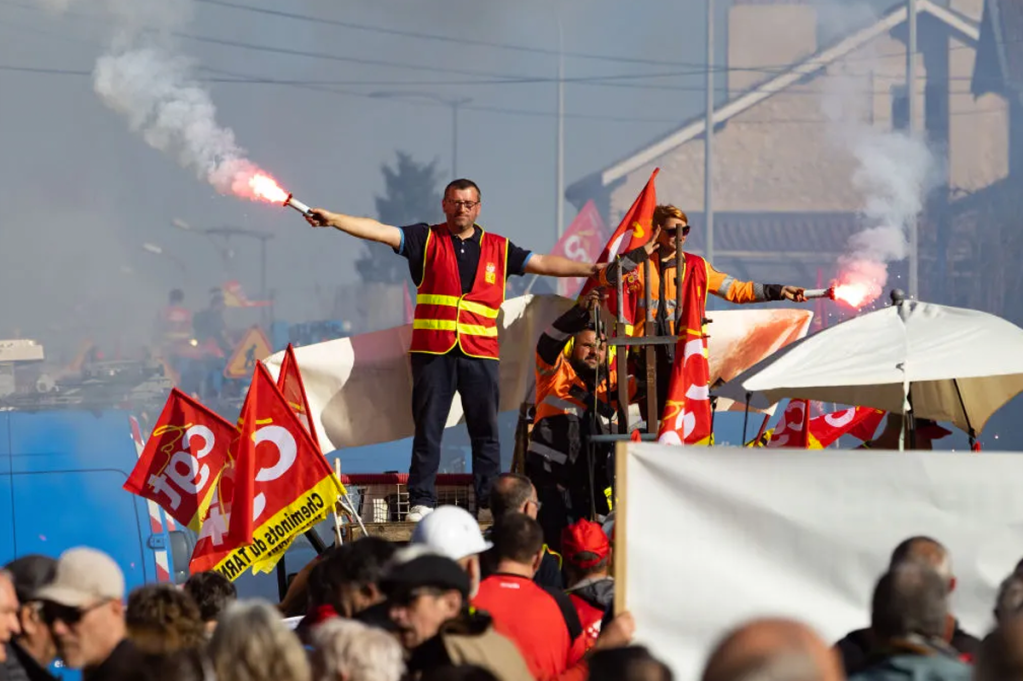On March 22, 1968 the slow burn that would eventually flare into France’s “May ’68” began. The radical student movement known as “Mouvement du 22 Mars,” with Daniel Cohn-Bendit (Dany le Rouge) at its heart, was unaware its actions on this day would lead to riots and the eventual paralysis of the French state after workers joined them.
History does not repeat itself, it echoes. Even then, echoes from the past do not necessarily produce the same effects, no matter how many revolutions France has known. Nevertheless, fifty-five years later on this March 7, France will be paralyzed by widespread rolling strikes and demonstrations against President Macron’s proposed legislation to extend the retirement age from sixty-two to sixty-four years.
Quite exceptionally all French trades unions are united in the struggle. Strikes in the energy sector began last weekend, with rail, ports, air traffic controllers, truckers, schools and refuse collectors taking up the cudgel.
This comes after two previous 1 million-strong national demonstrations. According to multiple opinion polls 70 percent of the French oppose the bill. President Macron’s simple majority in the National Assembly is struggling to get the bill debated, let alone voted on. In the National Assembly filibustering and agitprop tactics by Jean-Luc Mélenchon’s radical France Insoumise MPs have blocked the bill’s passage. For the moment it continues in the Senate, but the government has the constitutional option to guillotine parliamentary discussion and apply the bill’s clauses through decrees.
Opponents, however, point to how demonstrations and strikes in 1995 forced President Jacques Chirac to withdraw his pension reform bill. The test will not be today, but the extent to which rolling strikes paint the rest of March red. Macron will take his cue from that indicator.
The stakes in the stand-off with Macron are high. He rightly claims that pension reform was a presidential election pledge in 2017 and 2022. His justification is the current astronomical pensions bill adding to France’s ballooning 115 percent national debt. His detractors argue that the true vote for Macron’s second mandate was a mere 20 or so percent with most voters reluctantly casting a Macron ballot to block Marine Le Pen. Consequently he has no mandate for pension reform. The fact that Macron’s reform agenda has been stalemated by strikes and Covid suggests pension reform defeat could cast him as a lame-duck president for his four remaining years, sealing his fate in history as a failure.
So where does this leave France’s fate? Is she on the cusp of insurrection or is this just more smoldering discontent? Macron may narrowly get his legislation passed by dint of Republican party MP support. But given the bill’s unpopularity that may seal their fate at the senatorial and European elections this year and next, while boosting Marine Le Pen and the Rassemblement National. Macron — who is a risk-taker — could resort to the constitutional nuclear option and dissolve parliament, call elections and hope for a majority that could push through his bill. But he knows from the polls there is a high chance the Rassemblement National will be returned as the biggest party in the National Assembly with the right to form a government.
Historically French insurrections and revolutions tend to be initiated by le peuple or students. February 1848 and May ’68 were student-led; 1789 and 1871 the people. It is indicative that the firebrand Jean-Luc Mélenchon is going all out to recruit student unions to the struggle. That is not easy on a pension issue that will not directly affect them for half a century. But he understands their historical potency in taking to the barricades and radicalising the struggle. Involving high school pupils is a bonus known to provoke middle-class parental anxiety and apply political pressure to power.
How far universities shut down and lycéens take to the streets will be a barometer of how worried President Macron should be. Then there is the added dimension of inflation and a cost-of-living crisis — both feature in most French revolutions. Any visitor to France senses its tinderbox state.
But despite opinion polls showing a large majority opposed to pension reform the same polls reveal a majority believe the law will pass anyway. Mercifully, as happens more often than not in French history, “red March” may just be another turning point that didn’t turn. Or more pessimistically, will March copy historical precedent? As the great political thinker and historian of revolution in France and the United States Alexis de Tocqueville warned: “History is a gallery of pictures where there are few originals and many copies.”
This article was originally published on The Spectator’s UK website.

























